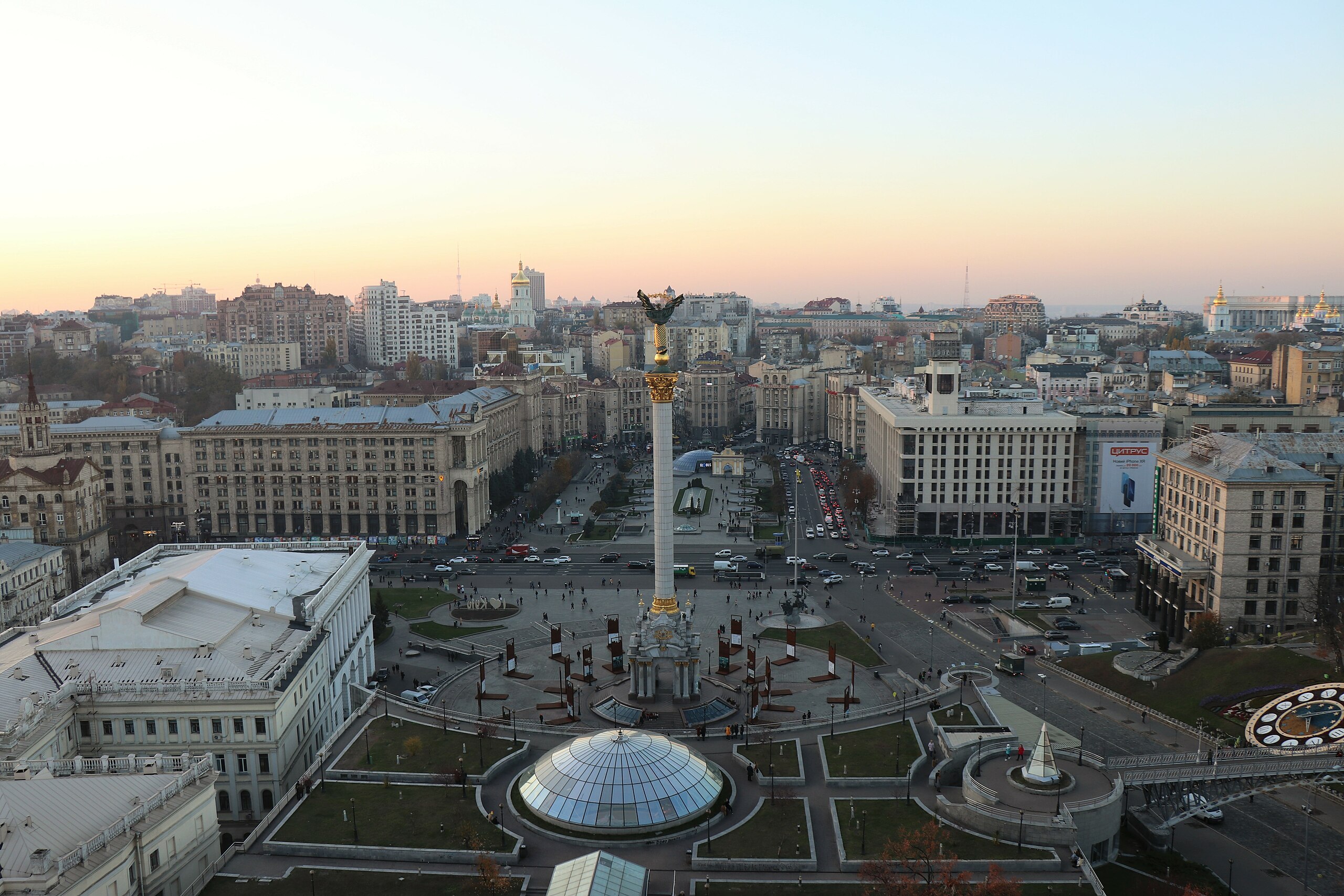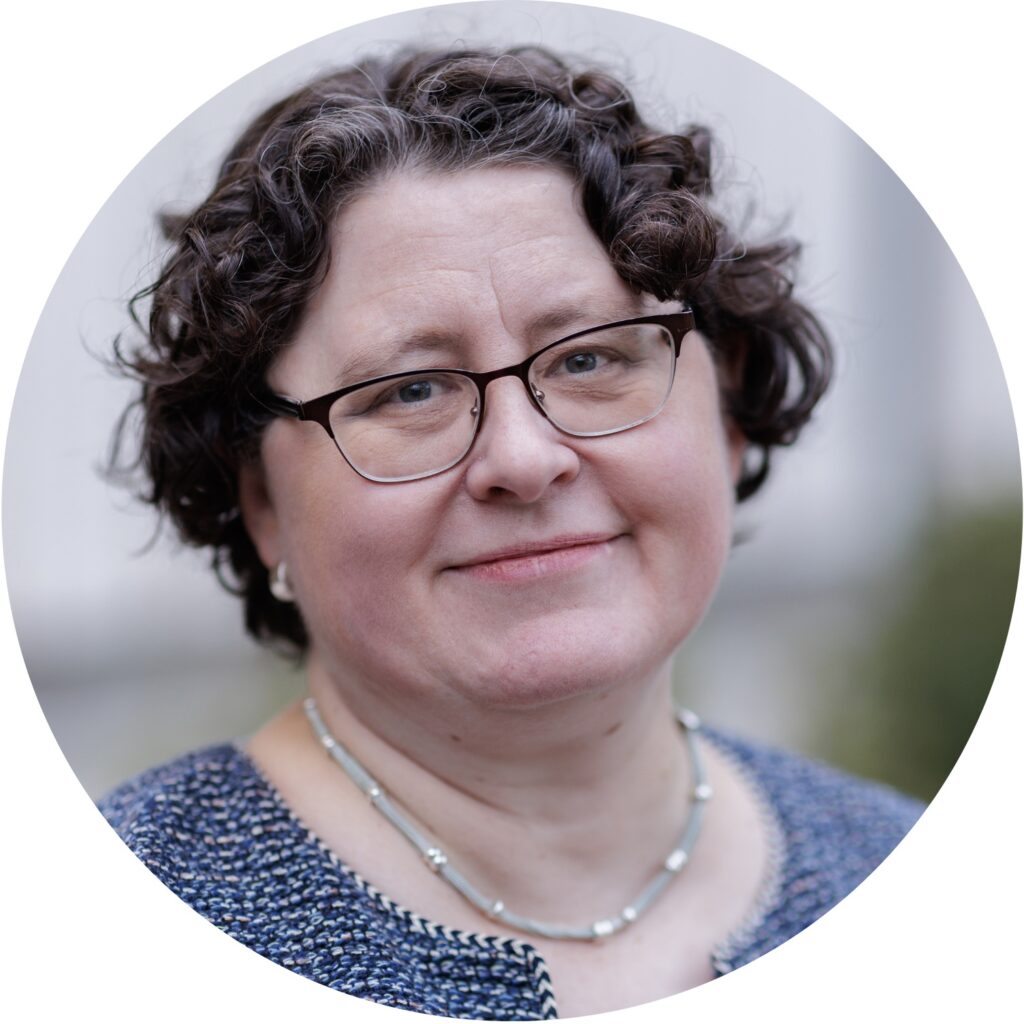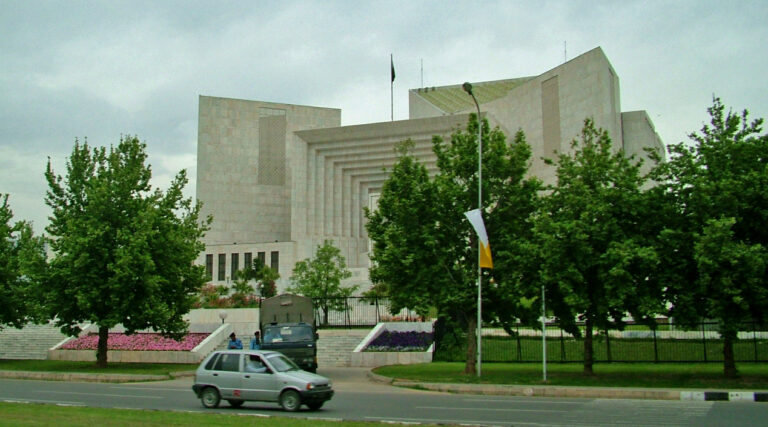
Religious Freedom in Ukraine: Can we move on from misleading election narratives?
Dmytro Vovk and Elizabeth A. Clark
Maidan Nezalezhnosti in Kiev, Ukraine by Juan Antonio Segal (CC BY-SA 4.0).
This article is part of our series on Transnational Christian Nationalism, and its impact on politics, the rule of law, and religious freedom. If you’d like to explore other articles in this series, click here.
Post-election, no one in the U.S. or abroad is entirely certain how the new Trump administration will come out on aid to Ukraine. Since 2022, President Trump and Vice-President Vance seem not to care much if Ukraine wins. In the run-up to the election Trump allies Congresswoman Marjorie Taylor Greene and media personality Tucker Carlson have raised questions regarding the treatment of the Ukrainian Orthodox Church (UOC) and have explicitly tied withdrawal of support from Ukraine with Ukraine’s actions against the Ukrainian Orthodox Church. Opponents of Trump & co. instead argue that there are no violations of religious freedom in Ukraine and that they should really be looking at violations in Russia instead. How should one take these claims? What basis (if any) do they have in fact? Are they entirely mutually exclusive? Where should we go from here?
Ukrainian Bans
On 24 August, Ukrainian Independence Day, Ukraine’s President Volodymyr Zelensky announced that he had signed Law No. 3894-IX banning the Russian Orthodox Church of the Moscow Patriarchate (ROC) as well as Ukrainian religious organizations affiliated with the ROC. In his speech on the same day, Zelensky stated that Ukrainian Orthodoxy had made a step “towards liberation from Moscow devils.”
The ban of the Russian Church’s activities in Ukraine is merely symbolic. In practical terms, the law, which is the result of two years of polarized political debates, targets primarily the Ukrainian Orthodox Church (UOC), which is ecclesiastically and canonically linked to the Moscow Patriarchate. While the church announced its “full independence” from the ROC in May 2022, many Ukrainians still perceive the church as affiliated with ROC, and this is one of the reasons that the Ukrainian government demands the church break fully with the Patriarch of Moscow.
According to the law, in order to be considered as non-affiliated (and, therefore, to avoid the ban), the UOC must cut all ecclesiastical ties with the ROC. Since Orthodox Churches traditionally depend on being formed or run under a pre-existing Orthodox Church, this amounts to a difficult conundrum. The UOC seemingly must choose between being banned, become an unrecognized Orthodox church (which is not supported by the UOC leadership and would result in losing the church’s ties to Global Orthodoxy), or joining the other Orthodox Church in Ukraine, the independent Orthodox Church of Ukraine (OCU), which was established in 2018 and is recognized by the Ecumenical Patriarchate. In the meantime, UOC parishes in the occupied territories are already being integrated into the Russian Orthodox Church, suggesting that the future of this church is bleak either way.
While the law has been endorsed by many Ukrainian parliamentarians and is broadly supported by the Ukrainian public, it has provoked concerns among many international religious freedom and human rights actors. Critics refer to incompliance with international standards in the law’s collective sanctioning of the UOC on the sole basis of ecclesiastical links to Moscow, with no proof offered and no need to prove the UOC’s institutional involvement in illegal activities.
Does the Law Fit International Religious Freedom Standards?
While the law remains an understandable reaction to an unlawful and horrific war, the law is problematic under international human rights standards for several reasons.
First, it makes the UOC liable for its mere religious affiliation with Moscow, in essence punishing a religion for its internal religious canons. This violates the principle of religious autonomy (independence in internal religious affairs). To make this worse, the law defines affiliation fairly loosely. In particular, some affiliation criteria refer to facts which are beyond the UOC and its communities’ control as a ground for the dissolution of the UOC. These include the language of the ROC charter and other documents as well as its decisions and actions. The expedited procedure of the prohibiting UOC communities also raises several rule of law concerns.
Second, the law would disproportionately punish the UOC for offenses of only some of its clergy. To date, UOC clergy have been involved in approximately 50 high-profile, proven-in-court, cases of national-security crimes. Three-fourths of these cases address inappropriate speech issues – from public or private denial or justification of the Russian aggression, to spreading religious hatred, to even espionage and treason. Yet this involves only a small fraction of the approximately 10,000 total members of the UOC clergy. International law prescribes that religious communities can be liquidated for institutional involvement in illegal behavior, but only as a last resort where this is necessary and proportionate and the other approaches have proven ineffective or are unavailable.
Third, and separate from the potential deprivation of legal status, UOC communities could face bans on renting or using State- and municipally owned properties, which would significantly restrict their operations.
Fourth, the law enables the ban of religious communities for the repeated dissemination of the “Russian World ideology”—a Russian imperialist narrative using political, cultural, and spiritual arguments to legitimize Russia’s exclusive right to control Ukraine. While Putin’s utilization of ideological and religious arguments to justify his aggression against Ukraine is apparent, the definition of the ‘Russian World’ entrenched in the law is so abstract that its implementation could be arbitrary.
The Perception of the Law in the American Context
The law has provoked global debates over religious freedom in Ukraine and has even made its way into American domestic politics and the presidential election. Two main approaches have emerged, but it is not clear which will prevail in the new Trump administration.
The first narrative (we call it the “persecution narrative”) has come from the right-wing side of the American political spectrum. Republican Senator Marjorie Greene condemned the Ukrainian government for “attacking Christians” and even “executing priests,” while praising the Russian regime for what she calls “protecting Christianity.” Then-Republican Vice-President nominee, J.D. Vance, long before the adoption of the law, claimed that the Ukrainian government had already “banned an entire Christian denomination.” Both Greene and J.D. Vance tried to limit the U.S. military and financial support of Ukraine, referring, inter alia, to the violations of religious rights. The UOC leadership seems to be leaning towards this narrative as well. The church’s lawyer and lobbyist in the U.S., Robert Amsterdam, called the law “religious cleansing.”
The second narrative (we call it the “no-violations narrative”) has been utilized by Ukrainian advocates at the U.S. Congress, as well as several religious freedom academics and activists. Their arguments can be summarized as the following: (1) Russia is the real violator of religious freedom, both on the Ukrainian occupied territories and domestically; (2) The Russian Orthodox Church’s support of Putin’s war is not religion but heresy and it’s “naïve” to think that the UOC has cut its ties with Moscow; (3) The law has the overwhelming support of Ukrainians, claiming that 85% of the population supports it; and (4) The law complies with religious freedom standards since “religious activities of UOC believers and staff can continue” even after the liquidation of UOC registered communities.
Therefore, as one of the supporters of the law says, those who are “truly concerned with religious freedom in Ukraine … should focus on the Russian-controlled areas.”
Why Both Narratives are Problematic
Both narratives are misleading and problematic. Ukraine is not engaging in “religious cleansing” or “executing priests.” It enjoys one of the highest levels of religious freedom in the region. In contrast to many of its neighbors, Ukraine maintains a highly competitive and pluralistic religious market with well-established religious minorities and well-developed infrastructure for religion-state dialogue. The country has one of the lowest levels of antisemitism in Europe and minorities that are often discriminated against or even banned in other countries of the region (such as Jehovah’s Witnesses) operate relatively freely and openly in Ukraine.
On the other hand, Law No. 3894-IX and its basic premise—sanctioning an entire religious community for its religious ties and the actions of some of its members—do provoke human rights concerns. However, the UOC still operates in the country and state policies regarding this church do not yet constitute systematic gross violations of religious freedom and other human rights that we observe in more conventional cases of religious persecutions (like China’s persecutions of the Uyghur or Myanmar’s persecutions of Rohingya).
In this sense, the persecution narrative is false. While the new law has some problematic elements, it seems clear that those proposing this narrative blow this out of proportion. They appear not to be focused on supporting religious freedom in Ukraine so much as instrumentalizing religious freedom language for conditioning or canceling U.S. aid to Ukraine—an idea that is popular among a significant number of Republican voters and leaders. Remarkably enough, neither “Christian nationalist” Greene nor Catholic Vance seems to pay any attention to the situation with religious freedom in Russia—one of the worst religious freedom violators in the world—even when this involves cases of persecution, detentions, tortures, and murders of their fellow Protestant and (Greek) Catholic priests and believers on the Ukrainian territories occupied by Russia.
The second narrative also does not stand up to scrutiny. Ukraine has a tradition of pluralism and well-established rights to religious freedom, but banning some or all of the branches of the UOC would be problematic. Religious freedom includes not only a right to gather as a religious group, but also a right to reasonable access to legal registration. Registration is an important element of collective religious freedom and is well-recognized by international and European law. State registration enables religious communities to acquire property, access to land and utilities, and avail themselves of tax exemptions available for religious or non-profit organizations. These benefits often serve as necessary preconditions for the community to develop and flourish.
Other arguments about Russia’s horrific religious freedom violations or the fact that the Ukrainian public supports the law –while both true – are irrelevant from a legal perspective. The fact that Russian brutally violates human rights does not justify Ukraine’s right to commit violations in response and human rights cannot be compromised or canceled based on public opinion or majority vote.
Like the persecution narrative, the no-violations narrative politicizes religious freedom issues for the sake of countering Vance, Greene and their supporters’ attempts to undermine the U.S. government’s consensus over the support of Ukraine. It fails to deal with legitimate concerns raised about the law out of a fear of being a “useful idiot” unwittingly supporting Putin’s injustices.
Moreover, it is important to note that this discussion, and the no-violations approach more broadly, ultimately are not about Ukraine or Russia. Neither the persecution narrative nor the no-violations narrative addresses the real situation on the ground. While the debate between these two approaches may sound like a high-minded human rights discussion about the situation in Ukraine, it really is just a part of domestic American politics rather than a genuine debate about Ukraine and its future. The no-violations narrative might serve a tactical goal of repelling attacks on Ukraine coming from right-wing politicians, but it is still strategically erroneous for two reasons.
First, the no-violations narrative is problematic on its own merits –the argument justifies the Ukrainian government’s populist initiatives that will likely reduce religious freedom and pluralism, negatively affect freedom of speech, and potentially intensify identarian splits within Ukrainian society. Like it or not, this overarching legislation will inevitably affect Ukrainian democracy and its ability to integrate into the West, which will be a crucial element of Ukraine’s security after the end of the war.
Secondly, the politicization of human rights by reputable religious freedom academics and defenders, even when done in good faith, undermines both human rights and the value of academic or expert knowledge. It creates more problems than benefits when experts justify evidently discriminative measures with abstract references to the protection of Ukrainian “spiritual space” instead of bluntly saying that the law does not strengthen Ukrainian security in any meaningful way. Similarly, experts undermine legal definitions of religious freedom and their own credibility when they mirror biased politicians and lobbyists instead of recommending that the Ukrainian government revoke a law which does not comply with international standards.
It’s also worth noting that concerns over the Ukrainian law are not merely abstract or speculative. Even before implementation of the law, we have already observed:
- cases of legally questionable and occasionally violent transitions of UOC communities to the independent Orthodox Church;
- a growing exclusion of the UOC from religion-state relations on both national and regional levels;
- the case of a university teacher in Cherkasy who was fired for her daughter’s support of the UOC and criticism of the OCU in strong language (the daughter herself was dismissed from the university); and
- growing public hatred towards the UOC and its believers with no appropriate reaction from the state. In fact, the Ukrainian government has not only failed to check public harassment of the UOC, but has itself applied anti-hate-speech norms discriminatorily, targeting almost exclusively UOC clerics and not members of other religions.
This kind of harassment and discrimination results from the law’s signaling to both public officials and private persons that UOC believers are second-class citizens, potentially or actually disloyal to the Ukrainian state, and that such communities should not be tolerated on Ukrainian soil.
Concluding Reflection
A more responsible and less politicized approach has yet to be found, one that we hope the new Trump administration will adopt. This approach should be based on the main premise that both the security of Ukraine and its commitment to human rights and the rule of law should be prioritized and understood as interwoven. Ukrainian survival after the war with Russia is in the American interest and will mean greater integration of Ukraine into North Atlantic structures. But becoming part of the club of Western nations involves more than just membership; it reflects a basic commitment to rule of law and human rights.
This approach requires that the U.S. government and third sector not only give financial and material war support to Ukraine, but also assistance to Ukraine in complying with human rights standards, especially when the public opinion in Ukraine leads the government away from these standards.
For the sake of both Ukraine and the United States, the politics of the Trump administration and American society towards Ukraine should be liberated from the false narratives of “religious persecution” and “no violations,” and should be replaced with an understanding of the realities on the ground and a commitment to supporting Ukraine’s physical security as well as religious freedom and rule of law. ♦

Dmytro Vovk is a Visiting Associate Professor at Benjamin N. Cardozo School of Law—Yeshiva University and a member of the OSCE/ODIHR Expert Panel on Freedom of Religion or Belief.

Elizabeth A. Clark is Associate Director of the International Center for Law and Religion Studies at Brigham Young University’s J. Reuben Clark Law School and a member of the OSCE/ODIHR Expert Panel on Freedom of Religion or Belief.
Recommended Citation
Clark, Elizabeth and Dmytro Vovk. “Religious Freedom in Ukraine: Can we move on from misleading election narratives?” Canopy Forum, November 27, 2024. https://canopyforum.org/2024/11/27/religious-freedom-in-ukraine-can-we-move-on-from-misleading-election-narratives/.
Recent Posts










